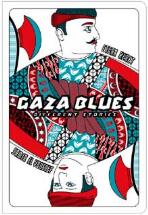Book Review: Etgar Keret and Samir El-Youssef's Gaza Blues
by anna battista
 Jorge Luis Borges claimed, "Reality is not always probable, or likely". Indeed, in his works, in the same way as in the works of other Argentinean writers such as Adolfo Bioy Casares, Silvina Ocampo, Julio Cortázar and Manuel Mujica Láinez, reality is not always "real", but it is distorted through the lens of fantasy, of the improbable, the impossible and the incredible. That is why these writers were part of what was called "realismo mágico", magic realism. What has this got to do with a book written in two halves, by two authors, an Israeli and a Palestinian? The answer is simple: practically everything. The book in question, Gaza Blues (David Paul Books), contains in the first half fifteen short stories by one of Israel's best writers and screenwriters, Etgar Keret, and, in the second part, a novella by writer and literary critic Samir El-Yussef, born in Lebanon and brought up in Rashidia refugee camp. Throughout the book there are strong elements of surrealism and magic realism, almost as if they were the only possible way to leave behind the conflicts in the Middle East and to give more relevance to unordinary tales lived by ordinary characters.
Jorge Luis Borges claimed, "Reality is not always probable, or likely". Indeed, in his works, in the same way as in the works of other Argentinean writers such as Adolfo Bioy Casares, Silvina Ocampo, Julio Cortázar and Manuel Mujica Láinez, reality is not always "real", but it is distorted through the lens of fantasy, of the improbable, the impossible and the incredible. That is why these writers were part of what was called "realismo mágico", magic realism. What has this got to do with a book written in two halves, by two authors, an Israeli and a Palestinian? The answer is simple: practically everything. The book in question, Gaza Blues (David Paul Books), contains in the first half fifteen short stories by one of Israel's best writers and screenwriters, Etgar Keret, and, in the second part, a novella by writer and literary critic Samir El-Yussef, born in Lebanon and brought up in Rashidia refugee camp. Throughout the book there are strong elements of surrealism and magic realism, almost as if they were the only possible way to leave behind the conflicts in the Middle East and to give more relevance to unordinary tales lived by ordinary characters.
The book opens with Keret's "Cramps", a three page story suspended between poetry and prose, as enigmatic and tragic as Silvina Ocampo's best works; "Glue" is the surreal recount of a woman gluing herself to the ceiling of her house; "For Only 9.99 (Incl. Tax and Postage)" is about naïve Nachum, who, through postal order, obtains a book that allows him to grasp the meaning of life; "Gaza Blues" is a short epiphany in which a lawyer reveals his colleague that he should have been born black and in New Orleans and should have become a singer; "Shoes" is about the consequences of the Holocaust in a pair of Adidas shoes. Everything is possible here from vacuum sealing oneself to magically reach another world through a bizarre construction of intricate pipes. Everything is terrible, like the fate of a woman killed in a suicide bomb attack in whose body a doctor finds something rather unexpected, but also comical, like the story of a soldier who, shot dead by a colleague because he talks too much, never seems to die, but actually derives much pleasure from sticking his fingers in the bullet hole in his head, producing a deeply unsettling effect on the other soldiers up to the point that the author himself has got to intervene to stop him.
Samir El-Youssef novella's "The Day The Beast Got Thirsty" takes place at the time of the first intifada, in a refugee camp in Lebanon, and is even more comical than the previous stories contained in the book. The main character, Bassem, perennially stoned, fluctuates in his own world, trying to escape to Germany, yet never doing anything to really leave the country. He mainly passes his time talking in cafés with his friend Ahmad, who's always raging about the intifada, the "Walking Disaster" (as he calls Arafat) and "the cause", often meaning with this expression his mother rather than the revolution ("…'the cause is going through one of its darkest eras', I knew that he must have had a row with his mother and that the old cow had accused him of being useless…"). While waiting for something to happen, like the main character in Dino Buzzati's "The Desert of the Tartars", Bassem listens to Ahmad's ranting and raving, makes plans that come to nothing to save his friend and drug dealer Salim, starts a relationship with the ugly Dalal and cynically discovers why he shouldn't be leaving, "…why on earth am I thinking of going to Germany?" he will wonder during an intimate encounter with Dalal, "Why don't I stay here and marry this monkey? I could sleep with her every night and in no time we would have ten children. We could row every day until Israel comes back again and destroys this fucking Camp all over our heads, so we die and that would be that."
Gaza Blues is an amazing book about the lives of Israeli and Palestinian anti-heroes and about surviving the tragedy of reality through the magic of literature. "Art! Art! That is what is going to save us from the degenerate state we are living in!" Ahmad proclaims at a certain point of El-Youssef's story. Well, if political leaders won't bring peace to the Middle East, art might as well try to.
Copyright (c) 2005 erasing clouds |
|